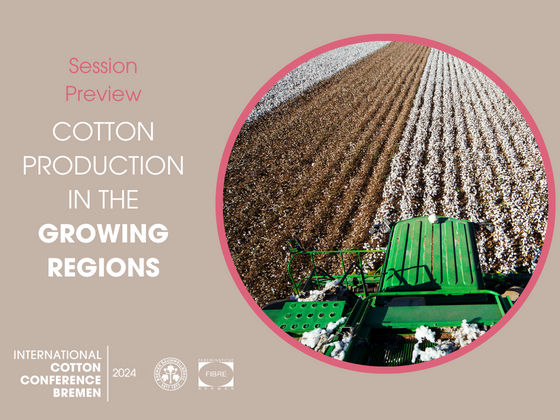What is meant by progressive cotton production?
The session ‘Cotton Production in Growing Regions‘ with four informative lectures will provide a focused look at the considerable progress being made in the development of cotton farming in growing regions.
The optimization of fibre yields and cotton quality aspects has always been the focus of the continued development of cultivation methods and seed research. In recent years, there have also been increasing demands from the perspective of sustainability and climate action, which are relevant at field level. This session shows how improvements to cotton are being researched and implemented in various growing regions around the world. It also provides facts and figures on current topics such as regenerative cotton cultivation and traceability methods.
USA: Fiber Quality Trends in the U.S. Cotton Crop by Region and Varieties Planted
David Albers, Bayer USA, will inform attendees about significant developments in the use of various genetically modified types of cotton in the US in the period from 2008 to 2022. The focus will be on analysing the progress in relation to fibre length. This is a key factor for the manufacture of high-quality yarns in the spinning mills.
China: Statistics and analysis of cotton fiber quality in China in 2022
Jingyan Wei from the Cotton Research Institute at the Chinese Academy of Agricultural Sciences in Anyang, will present the results of tests on various types of cotton in the form of 266 samples taken from the country’s main cotton growing regions. These were analysed using various test methods with regard to quality standards such as spinnability, uniformity of length, and strength. The findings confirmed that the quality of the samples met with the expectations of China’s spinning sector.
Uzbekistan: Innovations in Uzbekistan’s cotton sector
Rinat Gulyaev from the Cotton Science and Innovation Centre in Tashkent will speak about the extensive transformation of the Uzbek cotton sector as the basis of an ambitious textile export strategy. This includes the use of a monitoring system to check the growth process of seed cotton and the introduction of drip irrigation systems, as well as advanced developments in the field of organic agriculture and an increase in the use of machine harvesting. Also noteworthy are the investments in new instruments for testing cotton quality, and mechanisms for raw material traceability.
Greece: Regenerative practices for a sustainable and traceable EMEA cotton production
Chris Cavalaris from the University of Thessaly in Volos and Maria Stenull from the BASF Sustainability Team will report on findings from a pilot project on regenerative cultivation practices for sustainable and traceable cotton production in Greece. The University of Thessaly worked with selected Greek cotton farmers from three growing regions and the agricultural division of BASF to implement regenerative methods for producing certified, non-genetically modified cotton. This focused on comparing conventional farming with regenerative methods in relation to their life cycle analysis. During the conference, findings will be presented on developments regarding CO2 footprint, yields and other parameters between 2022 and 2023.
Further information on the sessions can be found in the programme on the conference website.

